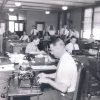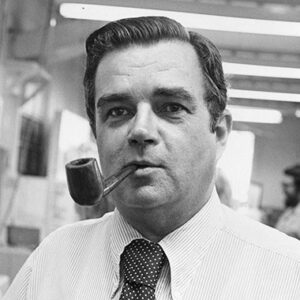calsfoundation@cals.org
Thomas Lee (Tom) Dearmore (1927–2004)
Thomas Lee Dearmore was a nationally recognized journalist and newspaper editor. A native of the Ozarks, Dearmore focused on politics and music in his writing. He worked at newspapers in Washington DC and San Francisco, California, and was an editor at the Arkansas Gazette for two years in the 1970s. Like his contemporary Harry Ashmore, Dearmore was a new breed of southern journalist who sought to distance Arkansas and the South from a segregationist past.
Tom Dearmore was born in Mountain Home (Baxter County) on September 11, 1927. He was the son of Benjamin Dearmore and Ethel Shiras Dearmore, both of whom were natives of Arkansas. During World War II, he was stationed in Las Cruces, New Mexico, where he also attended New Mexico College of Agriculture and Mechanic Arts (now New Mexico State University). From 1944 to 1946, he was in the U.S. Army Air Force, where he edited a newspaper while stationed in Spokane, Washington. Dearmore rose to the rank of corporal. He later attended Drury College in Springfield, Missouri.
On November 5, 1950, Dearmore married Reba Byrd, a teacher, musician, and businesswoman who was a native of Baxter County. They had two children. Reba died in 1989 in California.
Dearmore began his career in journalism at Mountain Home’s Baxter Bulletin, a newspaper begun by his family. His grandfather served as editor and publisher, and his father worked as a press operator. During Dearmore’s tenure at the Bulletin, the paper became the most-circulated weekly in the state. Dearmore first made a name for himself writing about politics. In recognition of his talent as a journalist, Dearmore was awarded a Nieman Fellowship from Harvard University, which enabled him to study for a year at the university in 1959–1960.
He was initially friends with Governor Orval Faubus, who had appointed Dearmore to the Publicity and Parks Commission (now the Department of Parks and Tourism). But when Faubus took his stand against the desegregation of Central High School in 1957, Dearmore turned against him. In the 1960s, Dearmore wrote about Faubus for the New York magazine the Reporter (now defunct), publishing such pieces as “Can Faubus Be Beaten?” about the 1962 election and “Arkansas: The Rage of the Rednecks” concerning the 1966 election and the rise of Winthrop Rockefeller.
Dearmore also wrote at length about music. A June 1968 article in the New York Times Magazine examined folk musician Bobby Lynn Blair and the songs of Dearmore’s native Ozarks. He also penned an article for the Arkansas Gazette concerning Johnny Cash’s April 1969 concert at Cummins Prison Farm. His influential article on Cash, “First Angry Man of Country Singers,” appeared in the New York Times Magazine in September 1969.
From 1970 to 1976, Dearmore worked at the Washington Star in Washington DC. He returned to Arkansas in 1976 to become the associate editor of the Arkansas Gazette. In 1978, he was lured to the San Francisco Examiner, where he worked as editorial director of the opinion section. In 1980, Dearmore was one of the five finalists for a Pulitzer Prize. That year, he also won the Walker Stone Award for editorial writing.
Dearmore’s politics were described as those of a “classic conservative who fought right-wing extremes in Arkansas and left-wing ones in California.” He detested the racial demagoguery that bedeviled his native Arkansas in the 1960s. He was an advocate for racial equality and feminist causes, such as women working as reporters, and he supported conservation efforts along the Buffalo River. When Dearmore defended the Native American stereotypes in the book Mary Poppins, however, Harry Ashmore—who, like Dearmore worked at the Arkansas Gazette before moving to California—called him “an emancipated Ozark hillbilly who takes special pride in the Cherokee strain in his ancestry.”
Dearmore retired in 1991. He kept writing and occasionally published columns. In 1992, he wrote a blistering article on conservative columnist Pat Buchanan, who was then running for the Republican presidential nomination. Dearmore attended the 1994 meeting of the American Society of Newspaper Editors in Washington DC, where he asked President Bill Clinton a question about foreign policy. Dearmore introduced himself as a native Arkansan who liked to “stir up trouble.” Clinton responded, “You’re still legendary down there, Mr. Dearmore.”
Dearmore died on July 2, 2004, in Cathlamet, Washington. He is buried next to his wife in Mountain Home Cemetery in Baxter County.
For additional information:
Compton, Neil. The Battle for the Buffalo River: A Twentieth-Century Conservation Crisis in the Ozarks. Fayetteville: University of Arkansas Press, 1992.
Dearmore, Tom. “Arkansan Johnny Cash is Now a National Sensation.” Arkansas Gazette, September 28, 1969, pp. 4E–5E.
———. “Arkansas: The Rage of the Rednecks.” The Reporter, October 20, 1966, pp. 24–28.
———. “First Angry Man of Country Singers.” New York Times Magazine, September 21, 1969, pp. 32–58.
———. “Where They Sing True Folk Songs ‘Older than Nobody Knows’: The Ballads of Bobby Lynn Blair.” New York Times Magazine, June 30, 1968, pp. 14–22.
Obituary of Tom Dearmore. Roller Funeral Homes. http://www.rollerfuneralhomes.com/services.asp?page=odetail&id=754&locid (accessed September 7, 2021).
Reed, Roy. Beware of Limbo Dancers: A Correspondent’s Adventures with the New York Times. Fayetteville: University of Arkansas Press, 2012.
“Tom Dearmore Wrote with an Eloquent Voice.” Masthead 56 (Fall 2004): 33.
Colin Woodward
UALR Center for Arkansas History and Culture
 Divergent Prosperity and the Arc of Reform, 1968–2022
Divergent Prosperity and the Arc of Reform, 1968–2022 Mass Media
Mass Media Tom Dearmore
Tom Dearmore 




Comments
No comments on this entry yet.